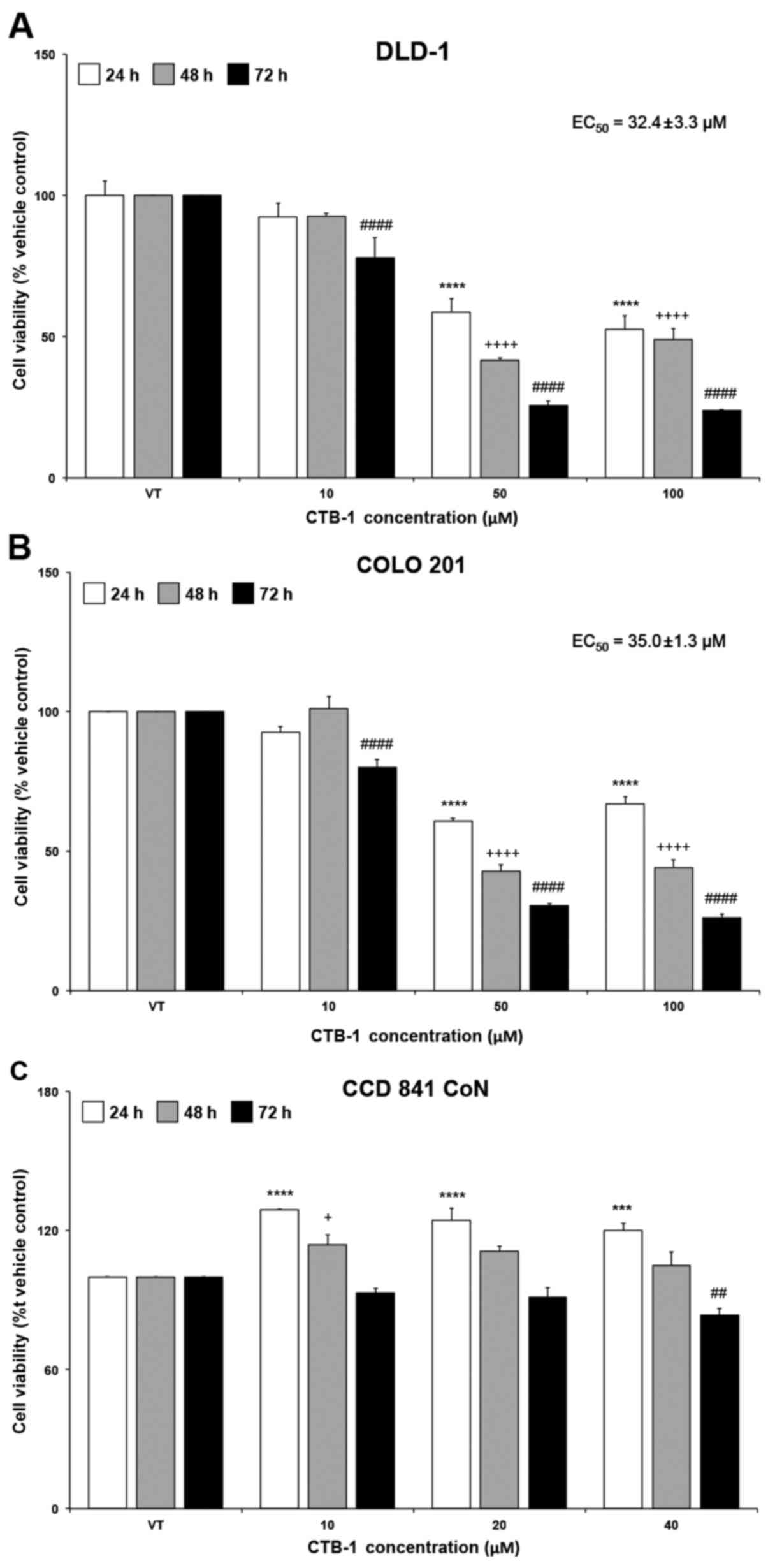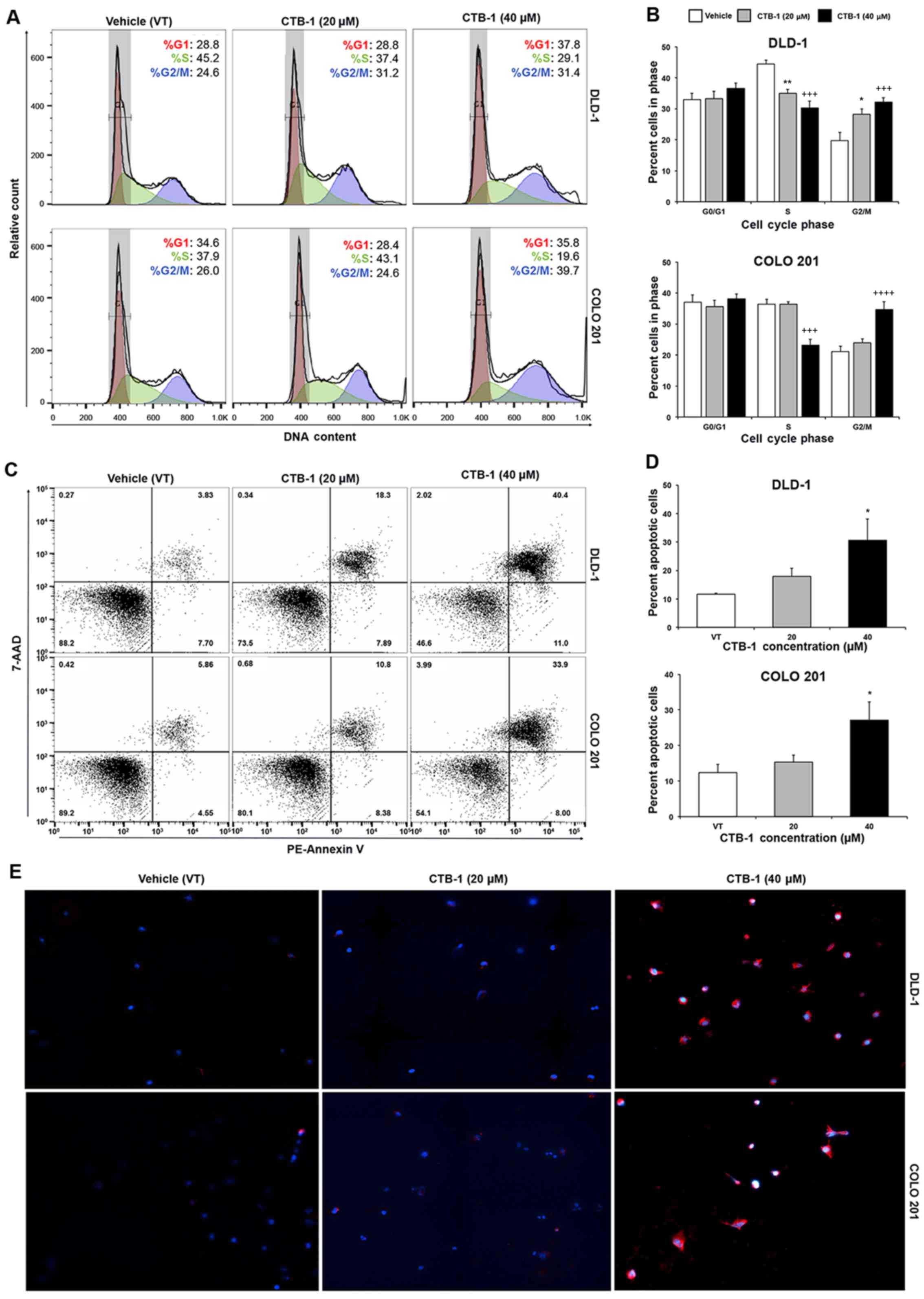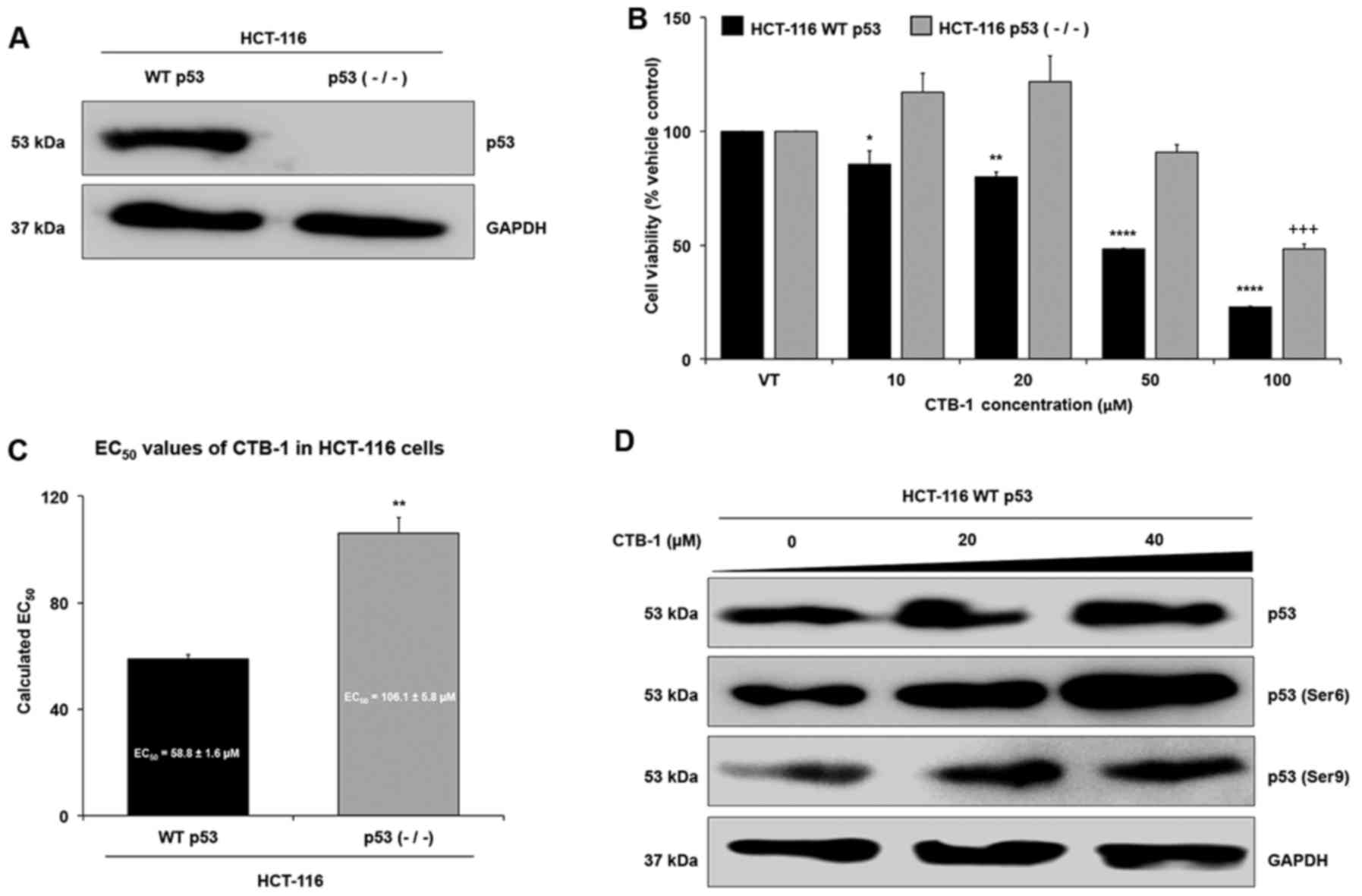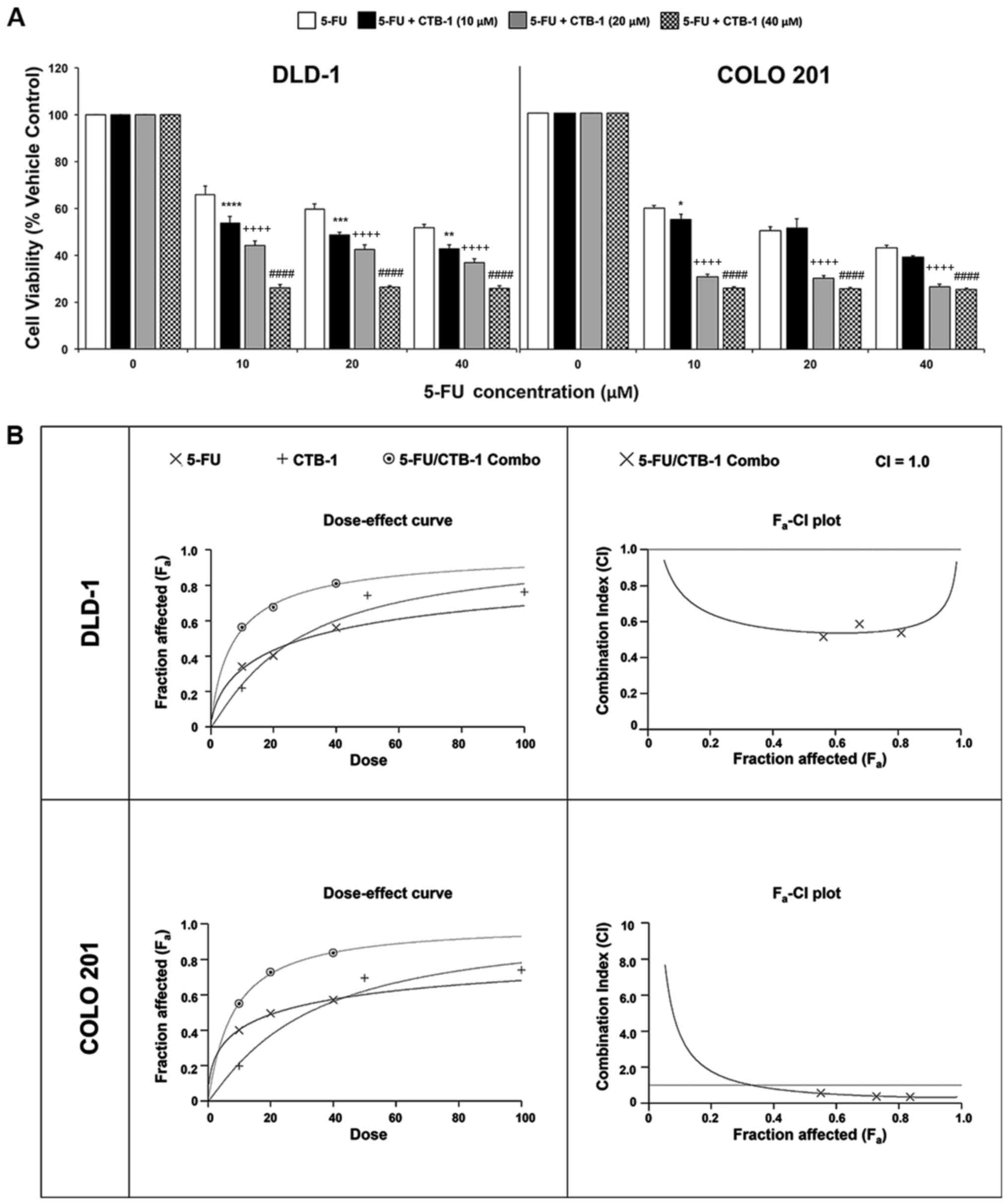|
1
|
Siegel RL, Miller KD and Jemal A: Cancer
Statistics, 2017. CA Cancer J Clin. 67:7–30. 2017. View Article : Google Scholar : PubMed/NCBI
|
|
2
|
Howlader N, Noone AM, Krapcho M, Miller D,
Bishop K, Altekruse SF, Kosary CL, Yu M, Ruhl J, Tatalovich Z, et
al: SEER Cancer Statistics Review, 1975–2013. National Cancer
Institute; Bethesda, MD: 2016
|
|
3
|
Braun MS and Seymour MT: Balancing the
efficacy and toxicity of chemotherapy in colorectal cancer. Ther
Adv Med Oncol. 3:43–52. 2011. View Article : Google Scholar : PubMed/NCBI
|
|
4
|
Hu CY, Chan W, Delclos GP and Du XL:
Adjuvant chemotherapy and risk of gastrointestinal, hematologic,
and cardiac toxicities in elderly patients with stage III colon
cancer. Am J Clin Oncol. 35:228–236. 2012. View Article : Google Scholar
|
|
5
|
Nadeem H, Jayakrishnan TT, Gamblin TC and
Turaga K: Cost differential among systemic therapies for colon
cancer. Ann Surg Oncol. 21:S832014.
|
|
6
|
Liu CJ, Lin JK, Chen W-S, Lin TC, Yang SH,
Jiang JK, Chang SC, Lan YT, Yen CC, Tzeng CH, et al: The efficacy
of chemotherapy in patients with high-grade metastatic colon
cancer. Hepatogastroenterology. 58:1495–1501. 2011. View Article : Google Scholar : PubMed/NCBI
|
|
7
|
Engstrom PF, Arnoletti JP, Benson AB III,
Chen YJ, Choti MA, Cooper HS, Covey A, Dilawari RA, Early DS,
Enzinger PC, et al National Comprehensive Cancer Network: NCCN
Clinical Practice Guidelines in Oncology: Colon cancer. J Natl
Compr Canc Netw. 7:778–831. 2009. View Article : Google Scholar : PubMed/NCBI
|
|
8
|
Patel BB, Sengupta R, Qazi S, Vachhani H,
Yu Y, Rishi AK and Majumdar AP: Curcumin enhances the effects of
5-fluorouracil and oxaliplatin in mediating growth inhibition of
colon cancer cells by modulating EGFR and IGF-1R. Int J Cancer.
122:267–273. 2008. View Article : Google Scholar
|
|
9
|
Patel BB, Gupta D, Elliott AA, Sengupta V,
Yu Y and Majumdar AP: Curcumin targets FOLFOX-surviving colon
cancer cells via inhibition of EGFRs and IGF-1R. Anticancer Res.
30:319–325. 2010.PubMed/NCBI
|
|
10
|
Chen WT-L, Yang T-S, Chen H-C, Chen HH,
Chiang HC, Lin TC, Yeh CH, Ke TW, Chen JS, Hsiao KH, et al:
Effectiveness of a novel herbal agent MB-6 as a potential adjunct
to 5-fluoracil-based chemotherapy in colorectal cancer. Nutr Res.
34:585–594. 2014. View Article : Google Scholar : PubMed/NCBI
|
|
11
|
Amin ARMR, Kucuk O, Khuri FR and Shin DM:
Perspectives for cancer prevention with natural compounds. J Clin
Oncol. 27:2712–2725. 2009. View Article : Google Scholar : PubMed/NCBI
|
|
12
|
Plumb GW, De Pascual-Teresa S,
Santos-Buelga C, Cheynier V and Williamson G: Antioxidant
properties of catechins and proanthocyanidins: Effect of
polymerisation, galloylation and glycosylation. Free Radic Res.
29:351–358. 1998. View Article : Google Scholar : PubMed/NCBI
|
|
13
|
Santos-Buelga C and Scalbert A:
Proanthocyanidins and tannin-like compounds - nature, occurrence,
dietary intake and effects on nutrition and health. J Sci Food
Agric. 80:1094–1117. 2000. View Article : Google Scholar
|
|
14
|
Prasad R, Vaid M and Katiyar SK: Grape
proanthocyanidin inhibit pancreatic cancer cell growth in vitro and
in vivo through induction of apoptosis and by targeting the
PI3K/Akt pathway. PLoS One. 7:e430642012. View Article : Google Scholar : PubMed/NCBI
|
|
15
|
Sharma SD, Meeran SM and Katiyar SK:
Proanthocyanidins inhibit in vitro and in vivo growth of human
non-small cell lung cancer cells by inhibiting the prostaglandin
E(2) and prostaglandin E(2) receptors. Mol Cancer Ther. 9:569–580.
2010. View Article : Google Scholar : PubMed/NCBI
|
|
16
|
Singh T, Sharma SD and Katiyar SK: Grape
proanthocyanidins induce apoptosis by loss of mitochondrial
membrane potential of human non-small cell lung cancer cells in
vitro and in vivo. PLoS One. 6:e274442011. View Article : Google Scholar : PubMed/NCBI
|
|
17
|
Nomoto H, Iigo M, Hamada H, Kojima S and
Tsuda H: Chemoprevention of colorectal cancer by grape seed
proanthocyanidin is accompanied by a decrease in proliferation and
increase in apoptosis. Nutr Cancer. 49:81–88. 2004. View Article : Google Scholar : PubMed/NCBI
|
|
18
|
Chen Q, Liu X-FF and Zheng P-SS: Grape
seed proanthocyanidins (GSPs) inhibit the growth of cervical cancer
by inducing apoptosis mediated by the mitochondrial pathway. PLoS
One. 9:e1070452014. View Article : Google Scholar : PubMed/NCBI
|
|
19
|
Vaid M, Singh T and Katiyar SK: Grape seed
proanthocyanidins inhibit melanoma cell invasiveness by reduction
of PGE2 synthesis and reversal of epithelial-to-mesenchymal
transition. PLoS One. 6:e215392011. View Article : Google Scholar : PubMed/NCBI
|
|
20
|
Engelbrecht AM, Mattheyse M, Ellis B, Loos
B, Thomas M, Smith R, Peters S, Smith C and Myburgh K:
Proanthocyanidin from grape seeds inactivates the PI3-kinase/PKB
pathway and induces apoptosis in a colon cancer cell line. Cancer
Lett. 258:144–153. 2007. View Article : Google Scholar : PubMed/NCBI
|
|
21
|
Nandakumar V, Singh T and Katiyar SK:
Multi-targeted prevention and therapy of cancer by
proanthocyanidins. Cancer Lett. 269:378–387. 2008. View Article : Google Scholar : PubMed/NCBI
|
|
22
|
Ting-Ting L, Tong L, Yu-Cong Z and Ke-Yuan
Z: Inhibitive effect of proanthocyanidins on cyclooxygenase-2
expression in A549 cells induced by cytokine interleukin-1 beta. J
Shanghai Jiaotong Univ. 17:500–504. 2012. View Article : Google Scholar
|
|
23
|
Jayaprakasha GK, Ohnishi-Kameyama M, Ono
H, Yoshida M and Jaganmohan Rao L: Phenolic constituents in the
fruits of Cinnamomum zeylanicum and their antioxidant activity. J
Agric Food Chem. 54:1672–1679. 2006. View Article : Google Scholar : PubMed/NCBI
|
|
24
|
Dall'Acqua S, Cervellati R, Speroni E,
Costa S, Guerra MC, Stella L, Greco E and Innocenti G:
Phytochemical composition and antioxidant activity of Laurus
nobilis L. leaf infusion J Med Food. 12:869–876. 2009. View Article : Google Scholar
|
|
25
|
Taher M: Majid F adibah abdul and Sarmidi
MRS: A proanthocyanidin from cinnamomum zeylanicum stimulates
phosphorylation of insulin receptor in 3t3-l1 adipocytes. J Teknol.
44:53–68. 2006.
|
|
26
|
Bouaziz A, Salido S, Linares-Palomino PJ,
Sanchez A, Altarejos J, Bartegi A, Salido GM and Rosado JA:
Cinnamtannin B-1 from bay wood reduces abnormal intracellular
Ca2+ homeostasis and platelet hyperaggregability in type
2 diabetes mellitus patients. Arch Biochem Biophys. 457:235–242.
2007. View Article : Google Scholar
|
|
27
|
Ben Amor N, Bouaziz A, Romera-Castillo C,
Salido S, Linares-Palomino PJ, Bartegi A, Salido GM and Rosado JA:
Characterization of the intracellular mechanisms involved in the
antiaggregant properties of cinnamtannin B-1 from bay wood in human
platelets. J Med Chem. 50:3937–3944. 2007. View Article : Google Scholar : PubMed/NCBI
|
|
28
|
Bouaziz A, Romera-Castillo C, Salido S,
Linares-Palomino PJ, Altarejos J, Bartegi A, Rosado JA and Salido
GM: Cinnamtannin B-1 from bay wood exhibits antiapoptotic effects
in human platelets. Apoptosis. 12:489–498. 2007. View Article : Google Scholar
|
|
29
|
Wen L, You L, Yang X, Yang J, Chen F,
Jiang Y and Yang B: Identification of phenolics in litchi and
evaluation of anticancer cell proliferation activity and
intracellular antioxidant activity. Free Radic Biol Med.
84:171–184. 2015. View Article : Google Scholar : PubMed/NCBI
|
|
30
|
Kashiwada Y, Nonaka G, Nishioka I, Chang
JJ and Lee KH: Antitumor agents, 129. Tannins and related compounds
as selective cytotoxic agents. J Nat Prod. 55:1033–1043. 1992.
View Article : Google Scholar : PubMed/NCBI
|
|
31
|
Chou TC and Talalay P: Analysis of
combined drug effects: A new look at a very old problem. Trends
Pharmacol Sci. 4:450–454. 1983. View Article : Google Scholar
|
|
32
|
Chou TC and Talalay P: Quantitative
analysis of dose-effect relationships: The combined effects of
multiple drugs or enzyme inhibitors. Adv Enzyme Regul. 22:27–55.
1984. View Article : Google Scholar : PubMed/NCBI
|
|
33
|
Chou TC: Drug combination studies and
their synergy quantification using the Chou-Talalay method. Cancer
Res. 70:440–446. 2010. View Article : Google Scholar : PubMed/NCBI
|
|
34
|
Kelly C and Cassidy J: Chemotherapy in
metastatic colorectal cancer. Surg Oncol. 16:65–70. 2007.
View Article : Google Scholar : PubMed/NCBI
|
|
35
|
Chibaudel B, Tournigand C, André T and de
Gramont A: Therapeutic strategy in unresectable metastatic
colorectal cancer. Ther Adv Med Oncol. 4:75–89. 2012. View Article : Google Scholar : PubMed/NCBI
|
|
36
|
Goodwin RA and Asmis TR: Overview of
systemic therapy for colorectal cancer. Clin Colon Rectal Surg.
22:251–256. 2009. View Article : Google Scholar :
|
|
37
|
Hanahan D and Weinberg RA: Hallmarks of
cancer: The next generation. Cell. 144:646–674. 2011. View Article : Google Scholar : PubMed/NCBI
|
|
38
|
Abraha AM and Ketema EB: Apoptotic
pathways as a therapeutic target for colorectal cancer treatment.
World J Gastrointest Oncol. 8:583–591. 2016. View Article : Google Scholar : PubMed/NCBI
|
|
39
|
Fridman JS and Lowe SW: Control of
apoptosis by p53. Oncogene. 22:9030–9040. 2003. View Article : Google Scholar : PubMed/NCBI
|
|
40
|
Haupt S, Berger M, Goldberg Z and Haupt Y:
Apoptosis - the p53 network. J Cell Sci. 116:4077–4085. 2003.
View Article : Google Scholar : PubMed/NCBI
|
|
41
|
Lane DP: Cancer. p53, guardian of the
genome. Nature. 358:15–16. 1992. View Article : Google Scholar : PubMed/NCBI
|
|
42
|
Higashimoto Y, Saito S, Tong XH, Hong A,
Sakaguchi K, Appella E and Anderson CW: Human p53 is phosphorylated
on serines 6 and 9 in response to DNA damage-inducing agents. J
Biol Chem. 275:23199–23203. 2000. View Article : Google Scholar : PubMed/NCBI
|
|
43
|
Kaeser MD, Pebernard S and Iggo RD:
Regulation of p53 stability and function in HCT116 colon cancer
cells. J Biol Chem. 279:7598–7605. 2004. View Article : Google Scholar
|
|
44
|
Schuler M, Bossy-Wetzel E, Goldstein JC,
Fitzgerald P and Green DR: p53 induces apoptosis by caspase
activation through mitochondrial cytochrome c release. J Biol Chem.
275:7337–7342. 2000. View Article : Google Scholar : PubMed/NCBI
|
|
45
|
Soussi T, Ishioka C, Claustres M and
Béroud C: Locus-specific mutation databases: Pitfalls and good
practice based on the p53 experience. Nat Rev Cancer. 6:83–90.
2006. View Article : Google Scholar : PubMed/NCBI
|
|
46
|
Siegel R, Ma J, Zou Z and Jemal A: Cancer
Stat. 2014:9–29. 2014.
|
|
47
|
Hemann MT and Lowe SW: The p53-Bcl-2
connection. Cell Death Differ. 13:1256–1259. 2006. View Article : Google Scholar : PubMed/NCBI
|
|
48
|
Al-Suhaibani ES: Antiproliferation and
antiactivity of proanthocyanidins against colorectal cancer cells
(Caco-2) line through mitochondrial pathway. Int J Adv Sci Tech
Res. 4:152–161. 2015.
|
|
49
|
Roy AM, Baliga MS, Elmets CA and Katiyar
SK: Grape seed proanthocyanidins induce apoptosis through p53, Bax,
and caspase 3 pathways. Neoplasia. 7:24–36. 2005. View Article : Google Scholar : PubMed/NCBI
|
|
50
|
Liu Y and Bodmer WF: Analysis of P53
mutations and their expression in 56 colorectal cancer cell lines.
Proc Natl Acad Sci USA. 103:976–981. 2006. View Article : Google Scholar : PubMed/NCBI
|
|
51
|
Yoo MH, Xu XM, Carlson BA, Patterson AD,
Gladyshev VN and Hatfield DL: Targeting thioredoxin reductase 1
reduction in cancer cells inhibits self-sufficient growth and DNA
replication. PLoS One. 2:e11122007. View Article : Google Scholar : PubMed/NCBI
|
|
52
|
Sun G and Kemble DJ: To C or not to C:
Direct and indirect redox regulation of Src protein tyrosine
kinase. Cell Cycle. 8:2353–2355. 2009. View Article : Google Scholar : PubMed/NCBI
|
|
53
|
Vaughn AE and Deshmukh M: Glucose
metabolism inhibits apoptosis in neurons and cancer cells by redox
inactivation of cytochrom c. Nat Cell Biol. 10:1477–1483. 2008.
View Article : Google Scholar : PubMed/NCBI
|
|
54
|
Salvioli S, Storci G, Pinti M, Quaglino D,
Moretti L, Merlo-Pich M, Lenaz G, Filosa S, Fico A, Bonafè M, et
al: Apoptosis-resistant phenotype in HL-60-derived cells HCW-2 is
related to changes in expression of stress-induced proteins that
impact on redox status and mitochondrial metabolism. Cell Death
Differ. 10:163–174. 2003. View Article : Google Scholar : PubMed/NCBI
|
|
55
|
Mileo AM and Miccadei S: Polyphenols as
modulator of oxidative stress in cancer disease: New therapeutic
strategies. Oxid Med Cell Longev. 2016:64756242016. View Article : Google Scholar
|
|
56
|
Cos P, De Bruyne T, Hermans N, Apers S,
Berghe DV and Vlietinck AJ: Proanthocyanidins in health care:
Current and new trends. Curr Med Chem. 11:1345–1359. 2004.
View Article : Google Scholar : PubMed/NCBI
|
|
57
|
Lee DH, Lee TH, Jung CH and Kim YH:
Wogonin induces apoptosis by activating the AMPK and p53 signaling
pathways in human glioblastoma cells. Cell Signal. 24:2216–2225.
2012. View Article : Google Scholar : PubMed/NCBI
|
|
58
|
Sharif T, Auger C, Alhosin M, Ebel C,
Achour M, Etienne-Selloum N, Fuhrmann G, Bronner C and Schini-Kerth
VB: Red wine polyphenols cause growth inhibition and apoptosis in
acute lymphoblastic leukaemia cells by inducing a redox-sensitive
up-regulation of p73 and down-regulation of UHRF1. Eur J Cancer.
46:983–994. 2010. View Article : Google Scholar : PubMed/NCBI
|
|
59
|
Shankar S and Srivastava RK: Involvement
of Bcl-2 family members, phosphatidylinositol 3'-kinase/AKT and
mitochondrial p53 in curcumin (diferulolylmethane)-induced
apoptosis in prostate cancer. Int J Oncol. 30:905–918.
2007.PubMed/NCBI
|
|
60
|
Ye R, Goodarzi AA, Kurz EU, Saito S,
Higashimoto Y, Lavin MF, Appella E, Anderson CW and Lees-Miller SP:
The isoflavonoids genistein and quercetin activate different stress
signaling pathways as shown by analysis of site-specific
phosphorylation of ATM, p53 and histone H2AX. DNA Repair (Amst).
3:235–244. 2004. View Article : Google Scholar
|
|
61
|
Su CC, Lin JG, Li TM, Chung JG, Yang JS,
Ip SW, Lin WC and Chen GW: Curcumin-induced apoptosis of human
colon cancer colo 205 cells through the production of ROS,
Ca2+ and the activation of caspase-3. Anticancer Res.
26:4379–4389. 2006.
|
|
62
|
Méplan C, Richard MJ and Hainaut P: Redox
signalling and transition metals in the control of the p53 pathway.
Biochem Pharmacol. 59:25–33. 2000. View Article : Google Scholar
|
|
63
|
Maillet A and Pervaiz S: Redox regulation
of p53, redox effectors regulated by p53: A subtle balance.
Antioxid Redox Signal. 16:1285–1294. 2012. View Article : Google Scholar
|
|
64
|
Liu B, Chen Y and St Clair DK: ROS and
p53: A versatile partnership. Free Radic Biol Med. 44:1529–1535.
2008. View Article : Google Scholar : PubMed/NCBI
|



















